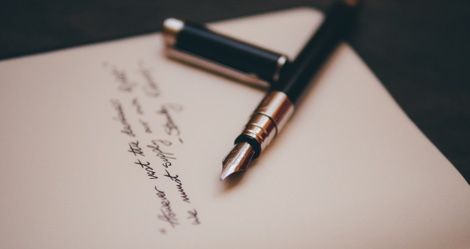
Mightier Than the Sword: on Pen Names and LGBTQ+ Identities
Pen names are not something I’ve ever considered in great detail before. I have flirted with the possibility of using one, considering my real-life initials and the unfortunate pronunciation of my surname (yes, it does sound how it looks). My relationship with my name is a complicated one, and I tend to go by a nickname more so than my given name. As such, I am also sympathetic towards the prevalence of pen names used by early women writers: the Brontë sisters became the Bell brothers; Mary Anne Evans became George Eliot; Mary Shelley didn’t use a name at all.
More recently, a number of women writers have opted to use initials – a decision made for J.K. Rowling by Bloomsbury, allegedly because they thought “this book will appeal to both boys and girls” and wanted to “disguise” her identity as a woman. Pen names have a chequered history with the identities of and proper accolades for women writers, feeding into the cultural disbelief that women can create great or popular art.
There are also, of course, the likes of Dr Seuss and Lemony Snickett, names chosen to add to the mythology of the writer and the stories they create. Some have more practical reasons, like Stephen King’s pen name of Richard Bachman, which was used to trick readers into buying more than one King book in a year.
Trends in the popularity of crime fiction have seen a number of male authors taking on female pseudonyms, a phenomenon which has been written up in both The Atlantic and The Wall Street Journal. An issue that is raised in the former article is that these are often stories written about women being brutalised and killed, and they are being written by men. The nom de plume is not so much a lie as it is a promise of a safe space – a story being told about the fears of women, by a woman who shares those same fears. It seems, to me, long detached from a pen name used for the simple purpose of getting the book published.
A friend of mine told me about a recent pen name discovery. She had been looking for some LGBTQ+ romance books, and happened across an M/M book on Amazon with a number of promising reviews. The book was allegedly written by a gay nonbinary person using they/them pronouns – but one commenter alleged that the writer was actually a cis het woman who had published other books under her real name.
The basic principle of the pen name applies: it has been chosen to promote the book to a specific audience. The problem is, though, that this author seemed to be projecting themselves as an Own Voices author to legitimise their writing about gay characters. At a time where readers are becoming more active and vocal in their quest for authentic representations of LGBTQ+ experiences, it seems at the least disingenuous, and at the most exploitative.
The importance of Own Voices writing is that it comes from a place of sincerity. It allows marginalised people – whether they be from the LGBTQ+ community, or a Person of Colour, or disabled, or part of a particular faith, or any combination thereof – to explore their identities in an honest and unfiltered way. It echoes that same promise of a woman writing crime fiction: that the readers’ experiences may be represented, and that they may find something they are looking for. In allegedly creating a false identity in this way, this author appears to be laying claim to the resonance between Own Voices author and target audience.
Obviously, it’s hard to pin down the intent of the author. It does seem curious, though, why she would choose to use a pen name only for an M/M-focused book and not for her others. It’s also curious why an author like Martyn Waites would save his own name for his “complex, metaphorical” work, and use the name Tania Carver for his “simple” creations. Why, too, did J.K. Rowling rebrand as Robert Galbraith for her own forays into crime fiction? Why did Dr Seuss not stick to his already silly name of Theodor Geisel? Some of these pen names are obviously innocuous, but it is a little hard not to view others as underhanded lies.
I think part of why this ‘they/them author’ debacle is getting to me so much is that actual nonbinary authors are few and far between. They are a writing demographic that is only just starting to get the love they deserve. There are some great examples of gender identity being explored in fiction and nonfiction, and of course genderqueer and nonbinary authors. Recent publications include the brilliant Ida by Alison Evans, and the upcoming I Wish You All the Best by Mason Deaver – both books with nonbinary characters and queer relationships, by nonbinary authors. To see someone assuming a nonbinary identity in an effort to gain readers is something that sits badly in my stomach, even though it is not my identity they are targeting.
It would be nice to believe that publishing and book sales are a meritocracy, but everything stretching back to and beyond Mary Shelley’s ‘anonymous’ work tells us that it isn’t. That said, there is still something bizarre about pretending to be someone else to promote a book. It’s especially bizarre considering that pen names don’t seem to hide their secret identities for very long; the truth will out, inevitably. For me personally, I will stick with my own name, unfavourable initials and slanderous surname aside.








